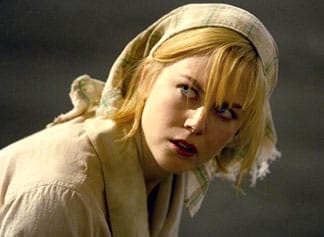In the eyes of many, Dogville gathers an immensely talented ensemble cast in order to watch Danish director Lars Von Trier abuse Nicole Kidman for three hours. And it's hard to argue the point it's certainly true that part one of Von Trier's trilogy about cruelty and human weakness does its fair share of beating up on the Aussie beauty. Kidman plays Grace, a Depression-era fugitive who arrives in the fictional Colorado town of Dogville seeking refuge, only to be exploited by its inhabitants. And if you have no interest in the construction or execution of cinema, Dogville may well bore and annoy you. But if, like me, you share a sick fascination with von Trier, who famously created a series of "rules" to avoid Hollywood traps and then abandoned them, he's nothing if not ambitious. Here, the entire film takes place on a soundstage laid bare of most props, buildings or even crew: it was von Trier's desire to light the entire film from above, to operate the camera himself, and to be the only person, other than the actors, anywhere near the stage. (Lights were operated from a distance.) It's a remarkable gambit for a filmmaker who, filming in continuity (which means in the order that the plot unfolds), takes the actors deep into this harrowing story. And upon repeat viewings, it is these structural elements and von Trier's desire for spontaneity (poor focus, missed lighting cues, forgotten lines) that fascinate. It's very clear that von Trier's primary interest is structural as well throughout his shared commentary with cinematographer Anthony Dod Mantle (The Celebration, 28 Days Later), von Trier never, ever acknowledges story, plot or the connections America has to the allegorical world he creates. (Famously, he's never been across the pond.) In fact, he reveals that watching the film again, it seems more European and less explicitly American, while my own impressions move in the opposite direction. The prickly director says that the film and particularly the truly remarkable digital construction of overhead shots was much harder than he had anticipated, but that he was too easy on the actors. Shooting in continuity, he feels, left them with a false sense of control, one that he would have liked to shatter. While von Trier completes work on Mandarlay, part two in this trilogy, he does so without Kidman, who withdrew due to "scheduling conflicts." (She's replaced by Ron Howard's daughter, Bryce Dallas Howard.) Perhaps Kidman realised that von Trier's world can be a fascinating place to visit but it's really hard to live there. (Lions Gate)
Dogville
Lars von Trier

BY James KeastPublished Sep 1, 2004



